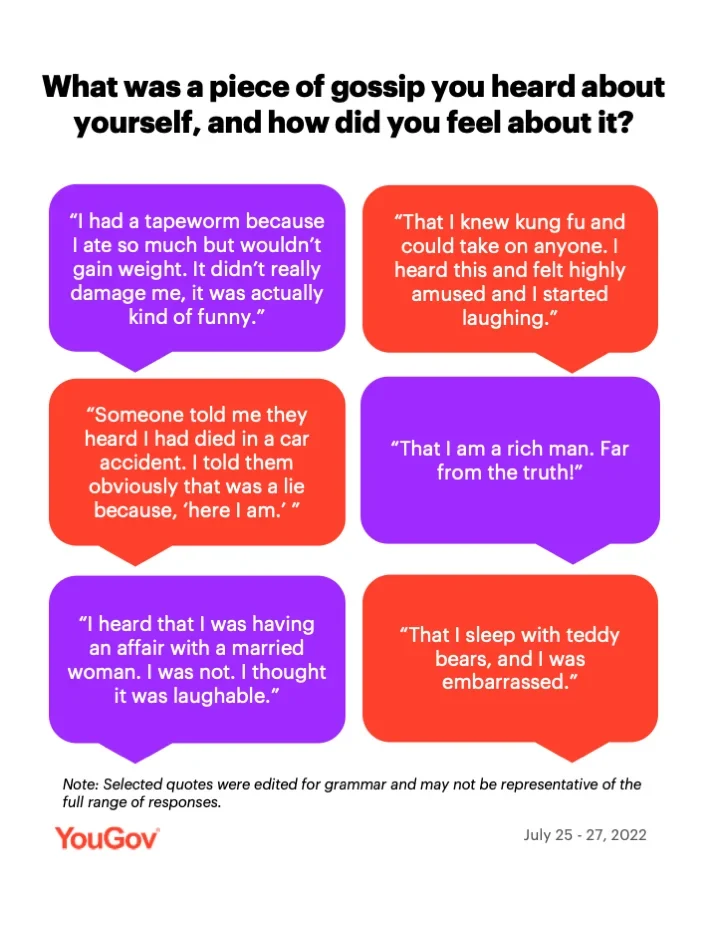It's common to be taught that gossiping is bad, but do Americans still believe that to be the case? A YouGov survey of 1,000 U.S. adult citizens asked Americans about their thoughts on gossip, gossip they've spread, and rumors they’ve heard about themselves. One consistent finding: Young Americans see gossip differently than older ones do.
Two-thirds of Americans say gossiping is usually (45%) or always (23)% bad for society, while just 5% say it usually or always good; 21% say gossiping is good as often as it is bad.
There are some notable differences in how Americans of different ages perceive gossip. Though majorities of all age groups say it is bad for society, adults under 30 (12%) are more likely than older Americans to say gossip is usually or always good. In contrast, just 1% of Americans 65 and older think gossip is usually or always good.
When asked to choose which words from a list of seven options describe the act of gossiping, 63% of Americans said gossiping is “harmful” and 58% said it is “mean-spirited.” Fewer chose the descriptors “sinful” (28%), “addictive” (28%), and “entertaining” (23%).
American adults between ages 18 and 29 are more likely than older Americans to see gossip as entertaining (34%), addictive (28%), and fun (20%). Larger percentages of 18-to 29-year-olds see gossip as harmful (43%) and mean-spirited (42%) — but these percentages are lower than the share of older Americans who see gossip in these ways.
Consistent with their other more characterizations of gossip and its effects, younger Americans are more likely than older ones to say they enjoy gossiping. Americans between the ages of 18 and 44 are especially likely to say they like gossiping somewhat or very much, at 32%. Among those older than 45, just 10% say they like gossiping. However, among each of the major age groups — including the younger ones — the people who say they do not enjoy gossiping outnumber the people who say they do.
While American adults hold a negative view of gossip, about half (51%) of Americans say they have spread a piece of gossip at some point. Women (55%) are more likely than men (46%) to say they’ve done this. Across age groups, people who are 65 and older are the least likely to say they’ve spread gossip, at 45%.
Among people who admit to having spread gossip, 87% say they’ve spread gossip that they knew was true. But about one in five (19%) say they’ve spread a piece of gossip that they knew was false. (Respondents could choose to say they've done both.) Among people who have ever spread gossip, men (23%) are more likely than women (15%) to say they’ve spread false gossip.
Many Americans also say they’ve tried to correct untrue gossip, with varying success.
Another experience many people share is that of hearing a rumor about themselves. While 43% say they’ve heard a piece of gossip about themselves that was true, 69% say they’ve heard gossip about themselves that was not true. Women (72%) are more likely than men (65%) to say they’ve heard an untrue rumor about themselves.
Respondents also had the option to share a piece of true or untrue gossip they’d heard about themselves, along with how it made them feel. Many shared rumors related to their romantic life, and a common theme was feeling hurt or angry about the gossip. Some shared workplace gossip, and others shared some especially outlandish rumors they’d heard about themselves.

— Carl Bialik, Linley Sanders, and Taylor Orth contributed to this article
This poll was conducted on July 25 - 27, 2022 among 1,000 U.S. adult citizens. Explore more on the methodology and data for this poll.
Image: Adobe Stock (.shock)












